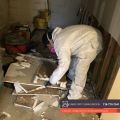Air Quality Testing for Mold: Types of Air Tests

Air quality testing for mold is a crucial step in identifying and addressing indoor mold issues. Mold growth can lead to poor indoor air quality, causing a range of health problems for occupants. Conducting air tests can help determine the presence of mold spores and assess the overall air quality in a building. In this article, we will explore the importance of air quality testing for mold and the different types of air tests commonly used to detect mold in indoor environments.
Importance of Air Quality Testing for Mold
Air quality testing for mold is essential for several reasons:
Identifying Hidden Mold: Mold can grow in hidden or hard-to-reach areas, such as behind walls or in ceiling cavities. Air testing can help detect mold spores even when the growth is not visible.
Health Concerns: Mold spores and mycotoxins released by mold can negatively impact indoor air quality and lead to various health issues, especially for individuals with allergies or respiratory conditions.
Indoor Air Quality Assessment: Air testing provides a comprehensive assessment of indoor air quality, helping to identify potential mold sources and other airborne pollutants.
Post-Remediation Verification: After mold remediation, air testing can confirm whether the mold issue has been effectively addressed and the indoor air quality restored to safe levels.
Types of Air Tests for Mold
There are several types of air tests commonly used to detect mold in indoor environments. Each test serves a specific purpose and provides valuable information about the presence and concentration of mold spores in the air. The main types of air tests for mold include:
Spore Trap Air Sampling
Spore trap air sampling is one of the most common methods used for mold testing. It involves using a specialized air sampling pump to draw air through a sampling cassette or filter. The cassette collects mold spores present in the air, which are later analyzed in a laboratory. The lab analysis provides information about the types and concentrations of mold spores in the air.
Culturable Air Sampling
Culturable air sampling involves collecting air samples on a petri dish containing a nutrient medium that supports mold growth. The petri dish is then incubated in a laboratory to allow mold spores to grow into visible colonies. This type of air sampling provides information about the types of mold present in the air and their ability to grow under specific conditions.
Direct Examination
Direct examination involves collecting air samples on a microscope slide or adhesive tape. The samples are then analyzed under a microscope to visually identify and quantify mold spores present in the air. This method can give immediate results and is useful for preliminary assessments.
Bioaerosol Impaction
Bioaerosol impaction involves using a bioaerosol sampler to impact air onto a nutrient-rich agar surface. This method collects viable and non-viable particles, including mold spores. The samples are then analyzed in a laboratory to determine the concentration of mold spores and other particles in the air.
PCR (Polymerase Chain Reaction)
PCR is a molecular-based method used to detect the presence of mold DNA in air samples. It can identify specific mold species, including those that may not be viable or easily cultured. PCR is a sensitive and reliable method for mold detection, providing precise and accurate results.
Conclusion
Air quality testing for mold is a crucial step in assessing indoor air quality and identifying potential mold issues in a building. The different types of air tests, such as spore trap air sampling, culturable air sampling, direct examination, bioaerosol impaction, and PCR, each offer unique insights into mold presence and concentration. Whether you suspect mold growth, are conducting post-remediation verification, or want to assess indoor air quality, air testing can provide valuable information to make informed decisions and ensure a safe and healthy indoor environment for occupants. For accurate and reliable air quality testing for mold, it is essential to engage certified mold professionals, such as Bay Area Mold Pros, who can conduct thorough assessments and provide expert advice on mold prevention and remediation.
Bayareamoldpros is a leading mold inspection and mold testing company providing quality mold analysis services and helping families & businesses overcome the devastating setbacks caused by mold. Bay Area Mold Pros suggests every homeowner in the San Francisco area should get periodic mold inspections. To schedule our mold inspection & mold testing services visit our website bayareamoldpros.com either email us or fill in the contact form on our website. We can be reached 24/7 at (650)762-6228.






